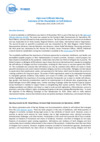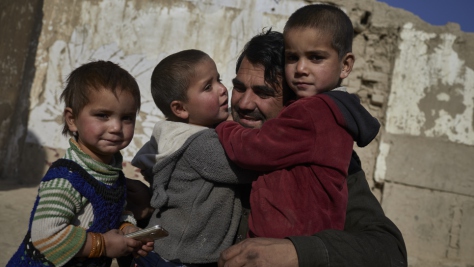Violence in northern Mali forces over 20,000 into exile
This is a summary of what was said by UNHCR spokesperson Adrian Edwards – to whom quoted text may be attributed – at today's press briefing at the Palais des Nations in Geneva.
UNHCR has deployed emergency teams to countries surrounding Mali to help meet the needs of some 20,000 people who have been forced to flee fighting in northern Mali. Most of the displaced are in Niger, Burkina Faso and Mauritania.
Fighting between rebel Tuareg groups and governmental forces in the Azawad region of northern Mali began in mid-January.
In the past three weeks, at least 10,000 people are reported to have crossed to Niger, 9,000 have found refuge in Mauritania and 3,000 in Burkina Faso.
In Niger, most of the new arrivals are from Menaka in Mali. Some have settled very close to the volatile border. Many of the new arrivals are sleeping in the open and have little access to shelter, clean water, health services, and food. People are scattered mainly in villages in Tillaberery, Ouallam, and Filingue districts, in the north of the country. Sinegodar, a village in Tillabery district, is hosting over 5,500 Malians, with one sole water point for the entire refugee and local population.
While most of those who recently fled Mali are Malians, recent arrivals in Niger also include nationals of Niger who had been living in Mali for decades. Many have been crossing the border between the two countries regularly to find grazing land for their cattle.
Local communities along the border, affected by the food crisis themselves in the Sahel, are sharing their resources with the new arrivals. The authorities have also distributed food. Four additional UNHCR staff are already in Niger and more are on their way. We plan to send aid for 10,000 people from our stockpiles in the region.
Our office in Ouagadougou, in Burkina Faso also reported the arrival of some 3,000 Malian Tuaregs following attacks on their homes and businesses in the Malian capital Bamako and in the nearby town of Kati last week. Many of the new arrivals are staying with host families in Ouagadougou and Bobo Dioulasso, 320 kilometres south-west of the capital. Other new arrivals have been reported in the north west of the country, especially near Djibo, in Soum province. An inter-agency mission, including UNHCR, is scheduled to go there by the end of the week to assess the needs of the people.
Meanwhile in Mauritania UNHCR has sent several missions to the village of Fassala, in the region of Hodh el Chargi 3km from the border with Mali, where over 9,000 people have arrived since 25th January. The mainly ethnic Tuareg Malian refugees come from the region of Léré on the other side of the border. They told UNHCR that they fled fighting between Government forces and rebel Tuareg fighters, fearing retaliation by army troops.
The Mauritanian authorities, with the support of UNHCR, are taking care of the new arrivals. Medical services are being offered by the local health clinics and water is being trucked in by the authorities. UNHCR Mauritania distributed 15-day food rations and non food items to cover the urgent needs of 5000 refugees in the refugee site of Fassala. Key needs identified are food, shelter and other basic items. UNHCR will strengthen its presence in Mauritania by fielding an emergency support team.
Fighting between the Tuareg liberation movement MNLA (Mouvement National de Liberation de l'Azawad) and governmental forces resumed on 17 January in Mali, breaking a 2009 agreement that had officially ended the Tuareg rebellion.
For further information on this topic, please contact:
- In Dakar: Helene Caux on mobile +221 77 333 12 91
- In Geneva: Fatoumata Lejeune-Kaba on mobile +41 79 249 3483
- In Geneva: Sybella Wilkes on mobile +41 79 557 9138
Related news and stories
Violence and threats by armed groups continue to displace refugees and civilians in Mali
Escalating violence leaves hundreds dead and hundreds of thousands on the move in eastern DRC
UNHCR urges greater support as violence continues unabated in Burkina Faso
Displaced people from climate frontlines raise their voices at COP27
UN warns of worsening conflict and displacement in Sahel without immediate climate action
UNHCR calls on States to refrain from forced returns of Haitians
-

Statement of Bangladesh on burden and responsibility sharing (Roundtable on the GCR Indicator launch, panel 1)
1 Dec 2021 Intervention from Bangladesh at the first preparatory roundtable on the GCR Indicator Report, panel on "Burden and responsibility sharing: what have we achieved and where do we go next?" -

Drumming against gender-based violence in Ecuador
1 Dec 2021 -

Summary of Roundtable 4: Self-reliance
1 Dec 2021 This document summarizes the roundtable on self-reliance, the fourth of a series of five preparatory roundtables to be held in the lead-up to the High-Level Officials Meeting. -

News Comment: UNHCR: Afghans struggle to seek safety as borders remain shut to most
1 Dec 2021 -

Evaluation of the Action Access pilot
1 Dec 2021 UNHCR has commissioned NatCen Social Research to undertake an independent evaluation of Action Access, the first pilot in the Community Engagement Pilot (CEP) series. This final evaluation report brings together findings from all elements of the evaluation to identify lessons learned from the Action Access pilot that can inform decision-making around further development and implementation of alternatives to detention in the UK and beyond. Attachments: Evaluation of the Action Access pilot (Executive summary) (.pdf) -

Resettlement Fact Sheet 2021
Dec 2021 -

UNHCR appalled by killings of dozens of displaced people by armed groups in eastern DRC
30 Nov 2021 -

Profiles of panelists: Preparatory Roundtable on Self-reliance
30 Nov 2021 Short profiles of all panelists who were part of the Preparatory Roundtable on Self-reliance. -

Refugees Fight Fires To Save Their Environment
30 Nov 2021
